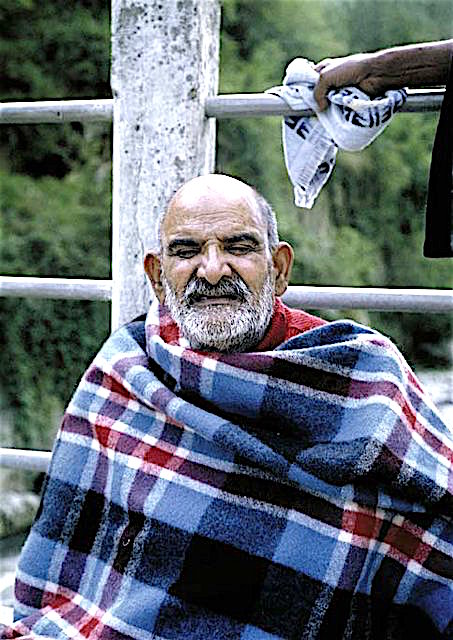I’m at a spiritual retreat in Maui, Hawaii, in 2016 and singer-songwriter Trevor Hall solemnly plays harmonium. In deep concentration, he sings a prayer in Sanskrit to the fierce Hindu Goddess Kali Ma. He explains why she is portrayed with skin as black as night, fangs, a necklace made out of human skulls and a belt made of severed arms. Despite her terrible form, Hall reveals that she is one of the most loving of all Hindu Goddesses. Later in the evening, he plays alone onstage with an acoustic guitar, with his quiet, intense energy. His songs are heartfelt and personal, as are the stories he shares.
Trevor Hall, singing to Kali Ma in Maui:
I recently saw Trevor Hall perform again in Montreal as part of the Montreal International Jazz Festival on June 29th, 2018 at Club Soda. He is clearly very excited about his new album, The Fruitful Darkness, and his tour across Canada, the US and Europe: “It’s a really fresh show for us. It’s always nice coming out with a new album, sharing the stories, sharing the songs.”
Indeed, compared to his performances in Maui, it was a radically different show in Montreal. He was accompanied by a dynamic three-piece band: an electric guitar, stand-up bass and heavy percussion. Occasionally, two drummers were playing simultaneously. The show alternated between quiet folksy, roots songs, electronic influences and dance-able rock-infused anthems. The crowd received Hall extremely warmly, especially after a much appreciated opening act by Jake Clemons, best known as the world-class saxophonist and multi-instrumentalist from Bruce Springsteen’s E-street band.
Some footage from the show:
Trevor Hall draws much of his musical inspiration from his travels in India and his spiritual quests and experiences, which are central to his life and message. He channels his spiritual life through his songwriting and profound performances – but his journey has not been without its twists and turns.
Over a decade ago, Hall was living in California and was on the path to becoming the next big pop star. He had signed with a major label – but in the end, the deal fell through and his dreams were shattered. Hall had been going to a temple dedicated to the goddess Kali, near Laguna Beach where he lived. “I couldn’t pay my rent and went to the temple one day with anxiety, not knowing what to do. I was desperate. They said, ‘Why don’t you just stay here until you get back on your feet’. So I moved in and I didn’t leave for eight years,” Hall recounts.
Hall’s new album The Fruitful Darkness is his first independent release and was funded through Kickstarter. The album became Kickstarter’s #1 music campaign of 2017. “I’ve been doing this for so long, about 15 years or so. I went through the whole major record label thing that didn’t work out very well. I went through the indie label thing, which was really good for me. As time has gone on, the whole music industry has really changed. Now we have Spotify and streaming, and as artists we have to adapt to the changes. My wife and I were doing a lot of the work and not seeing a lot of the return because we were on a label and they own everything. We’re rebellious and to be our own bosses was attractive to us,” Hall explains.
The song “What I know” from the album The Fruitful Darkness:
The Fruitful Darkness was released in three-song installments on specific lunar dates, culminating on June 1st 2018. I asked Hall how he came up with this strategy for the release of his album. “I didn’t want the stories to be lost, so that’s why we only released a few at a time. It worked out that we released each installment on the full moon symbolizing the fruit that’s in the darkness. By releasing three songs and having a month or two between, it really kept the conversation open for a whole year, which is really cool and really engaging for our community.”
The Fruitful Darkness was written at a difficult time in his life. There are references to the “Saturn’s return”, which in astrology signifies a three-year period where Saturn completes it’s 30 year cycle in his sun sign, “Sagittarius”, which is another name of a song on the album. Hall explains that the study of the stars is what got him through one of the most challenging periods in his life.

“For me, my Saturn return was really about me getting back in my body and speaking my truth and being blunt, not holding anything back. I’m a person who doesn’t like conflict and sometimes I avoid speaking the truth because I’m afraid it will upset people. I was also going through a lot of health challenges during that time. It was an intense time but very rewarding at the same time.”
I asked Hall how he was initially attracted to India and eastern spiritual traditions. When he was going to a boarding school in California during high school, a friend had a photo of an Indian saint named Maharaji on his bedroom wall. He lent Hall the book “The Miracle of Love”, which written by Ram Dass and is about Maharaji: “I stayed up all night and just read the book all through the night. That was it for me. Because Maharaji was from India, I wanted to learn about India. Because Maharaji loved [the Indian monkey god] Hanuman, I wanted to know everything about Hanuman. Everything stemmed from my love for him and that’s where it all started.”
Photo of Maharaji (or Neem Karoli Baba):

Trevor Hall is also known as “Ram Priya Dass” in spiritual circles. “My guruji in Laguna at the Kali temple gave me that name when I received my mantra. Usually when you receive a mantra, you’re gifted with a name. Than name signifies what you want to aspire into. “Dass” means servant. That’s a common thing that’s put on the end of names. It’s an important attitude. “Ram” is a name for the great spirit, the highest self. “Priya” means that which is geared to. So “the servant of that which is geared to Ram or the great spirit”. Maharaji said that the only thing that is geared to Ram is love. In a way, you can be the servant of that divine love.”
Hall’s performance in Montreal demonstrated that he is a true artist of the heart and spirit. He has done the work and lives up to his highest truth. He accepts that spirituality is not all about the light. There is destruction, there is darkness, but Hall found the fruit once again through music and faith.







